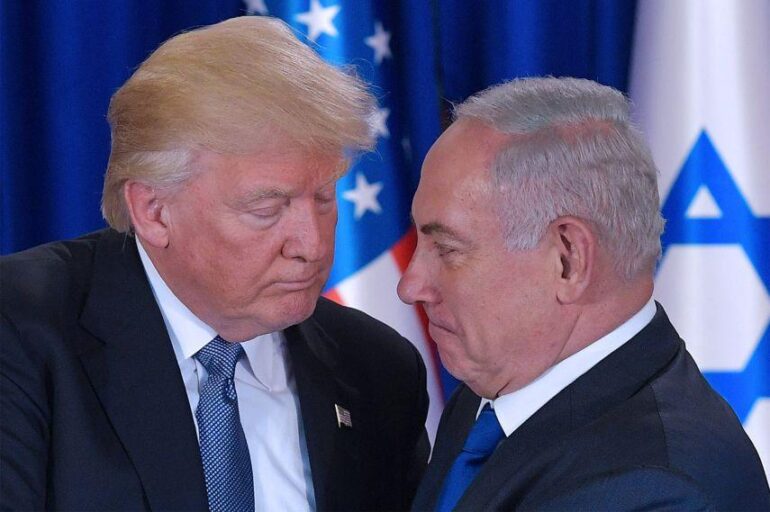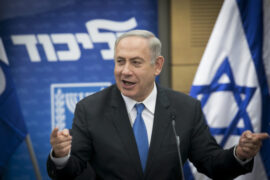United States President Donald Trump revealed on Wednesday that his administration aims to divide Israel into two separate states.
Trump made his support for the two-state solution clear at the beginning of a meeting in New York with Israeli Prime Minister Binyamin Netanyahu (Likud).
Netanyahu, once regularly criticized for antagonizing Washington but now enjoying a surge of domestic popularity due to his seemingly close relationship with Trump, was in no position to reject the president’s statements.
“I think that’s what works best,” Trump told Netanyahu, firmly reiterating his support several times for the policy that has long been a centerpiece of Washington’s Middle East agenda.
While Trump had expressed an openness to alternative solutions to the Israeli-Palestinian conflict at the beginning of his presidency, several reports in recent months have indicated that the his Middle East team had been working on a plan based on the two-state framework.
The White House team charged with drawing up the plan is led by Middle East special envoy Jason Greenblatt, US Ambassador to Israel David Friedman and Trump’s advisor and son-in-law Jared Kushner.
The president said Wednesday that his administration’s plan should be ready within four months.
During a press conference following Wednesday’s meeting with Netanyahu, Trump reiterated his support for partition.
The president also said that he regards attaining Israeli-Palestinian peace as a “dream of mine” and that he hopes to “to be able to get that done prior to the end of my first term. We’ll do other things in my second term.”
“I like a two-state solution,” he said. “That’s what I think works best.”
Trump then pointed to Netanyahu, seated next to him, and added, “You may have a different feeling. I don’t think so, but that’s mine.”
The prime minister did not respond but later told reporters he wasn’t surprised by Trump’s statements, claiming that “everyone defines the term ‘state’ differently” and that he had privately told the president that his priority was to maintain Israeli security control.
“I told the president that what is important is that the Palestinians won’t be able to threaten us, and for that reason there must be complete Israeli security control,” Netanyahu said in a clear attempt to spin the meeting as a diplomatic achievement.
Because Netanyahu’s domestic political capital largely rests on the perception of his strong relationship with Trump, the prime minister cannot directly reject Trump’s support for partition and will likely have less room to outmaneuver American pressure than he did during Barack Obama’s presidency.
Members of Netanyahu’s cabinet, however, felt less constricted when reacting to Trump’s comments.
“As long as the Bayit Yehudi is in the government, there will be no Palestinian state. That would be a disaster for Israel.”
Justice Minister Ayelet Shaked (Bayit Yehudi) responded to Trump’s statements Wednesday evening at a Sukkot celebration in Petaḥ Tikva.
“The establishment of a Palestinian state in the territories of Judea and Samaria is a bad solution and as long as the Bayit Yehudi is in the government it will not be established,” she said. “Not a ‘state minus’ and not a ‘state plus’. The solution should be regional and not only on the shoulders of the State of Israel.”
Defense Minister Avigdor Lieberman (Yisrael Beiteinu) returned from a trip to Washington in May with reports that the Trump plan would call for partitioning the country into two states and internationalizing Jerusalem’s Old City.
Following the revelation, many right-wing Jewish figures rushed to Trump’s defense by claiming the reports to be fabricated.
But based on over half a century of experience, it would have made sense for these Jews to err on the side of caution and assume that any US administration, whether Republican or Democrat, would seek to partition the country into two states.
At the time of Lieberman’s statements, the Trump plan was likely far from being finalized and the rumors should have been viewed as a test balloon by the administration, which would have meant that the Jewish reaction to the news – whether fake or not – might have helped determine how far Trump’s team felt it could push Jerusalem .
Rather than rushing to defend Trump and dismiss reports of his regional agenda as fabricated, those troubled by the notion of his administration forcing partition on Israel should have been expressing their outrage as aggressively as possible. The lack of such outrage likely convinced the administration that a plan based on America’s traditional two-state formula could work.
Trump has spent months positioning all the parties for a successful implementation of his plan.
By moving the US embassy from Tel Aviv to Jerusalem in such an ostentatious and divisive manner that played in the international press as a major Israeli diplomatic triumph over the Palestinians, the president and his team have fostered a political atmosphere in which Israel owes Washington big.
By diplomatically indebting Netanyahu to his administration and beating the Palestinian political leadership into submission, Trump seems to believe he can succeed where his predecessors have failed in partitioning Israel into two states, each dependent upon American power for survival.





